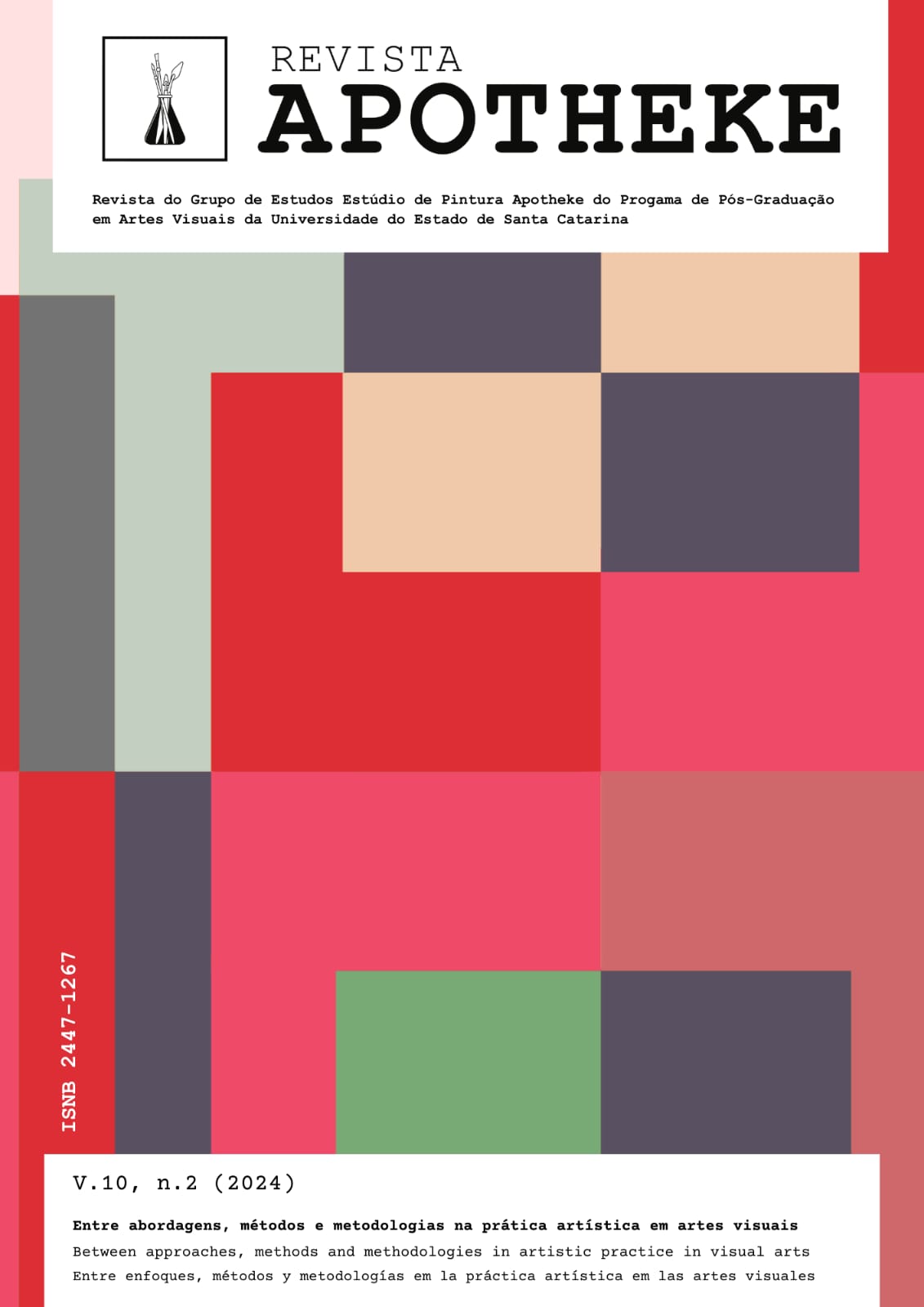Apuntes sobre la poiética como enfoque metodológico de la investigación en arte
DOI:
https://doi.org/10.5965/244712671022024013Palabras clave:
artes visuales, investigación en arte, enfoque metodológico, poiética, Sandra ReyResumen
Este artículo tiene como objetivo analizar los fundamentos de la poiética como enfoque metodológico de la investigación en Arte. Luego de una sucinta separación conceptual y una breve revisión histórica de la terminología y sus usos, se investiga la perspectiva propuesta por la Dr.ª Sandra Rey para la aplicación de aquella. Se advirtió, por lo tanto, que el enfoque poiético, además de flexibilizar los tránsitos entre las instancias de investigación en Arte, a veces se confunde con la génesis de la investigación en poética visual.
Descargas
Citas
ARISTÓTELES. Poética. Tradução e notas de Ana Maria Valente. 3. ed. Lisboa: Fundação Calouste Gulbenkian, 2008.
MARIZ, Débora. A finalidade poiética da ação na Ética Aristotélica. Filosofia Unisinos, São Leopoldo, v. 15, n. 2, p. 89-99, 2014.
PASSERON, René. A poiética em questão. Tradução Sonia Taborda. Porto Arte, Porto Alegre, v. 13, n. 21, p. 9-15, jun./nov. 2004.
PASSERON, René. Da estética à poiética. Porto Arte, Porto Alegre, v. 8, n. 15, p. 103-116, nov. 1997.
PASSERON, René. Poiética e Psicanálise. [Entrevista concedida a] Conceição Beltrão e Mario Fleig. Revista da Associação Psicanalítica de Porto Alegre, Porto Alegre, n. 18, p. 91-105, jun. 2000.
PEÑA CORTÉS, Olga N. A criação poética na perspectiva de Paul Valéry. Scriptorium, Porto Alegre, v. 2, n. 1, p. 22-31, jan./jun. 2016.
REY, Sandra. Da prática à teoria: três instâncias metodológicas sobre a pesquisa em Poéticas Visuais. Porto Arte, Porto Alegre, v. 7, n. 13, p. 81-95, nov. 1996.
REY, Sandra. Os escritos de artistas como elemento meta-artístico. In: Anais do 27º Encontro Nacional de Pesquisadores em Artes Plásticas, 27º, 2018, São Paulo. Anais do 27º Encontro da Anpap. São Paulo: UNESP, Instituto de Artes, 2018. p. 3230.
REY, Sandra. Por uma abordagem metodológica da pesquisa em Artes Visuais. In: BRITES, Blanca; TESSLER, Elida (org.). O meio como ponto zero: Metodologia da pesquisa em artes plásticas. Porto Alegre: UFRGS, 2002.
VALÈRY, Paul. Introdução ao Método de Leonardo da Vinci. São Paulo: Editora 34, 1998.
VALÈRY, Paul. Variedades. Organização de João Alexandre Barbosa. Tradução de Maiza Martins de Siqueira e João Alexandre Barbosa. 3.ed. São Paulo: Iluminuras, 2007.
Descargas
Publicado
Cómo citar
Número
Sección
Licencia
Derechos de autor 2024 Henrique Walter Ribeiro, Rebeca Stumm

Esta obra está bajo una licencia internacional Creative Commons Atribución-NoComercial 4.0.
Política de Derechos de Autor y Licenciamiento
Los autores de los trabajos enviados a la Revista APOTHEKE autorizan su publicación en formato impreso y digital, exclusivamente con fines académicos, pudiendo ser reproducidos siempre que se cite correctamente la fuente. Los autores certifican la originalidad, autoría y carácter inédito de sus manuscritos.
Los artículos publicados por la revista están disponibles gratuitamente y destinados a fines académicos y no comerciales. Todos los derechos de autor son cedidos a la revista. Los artículos firmados representan exclusivamente la opinión de sus autores y no reflejan la posición oficial de la Revista Apotheke. Los autores se comprometen a citar la publicación original siempre que reproduzcan, divulguem o hagan referencia al artigo publicado en la Revista Apotheke, de la siguiente forma:
“Este artículo fue publicado originalmente por la Revista Apotheke en el volumen (colocar el volumen), número (colocar el número), en el año (colocar el año), y puede ser consultado en: http://www.revistas.udesc.br/index.php/APOTHEKE/index”
Es responsabilidad exclusiva de los autores obtener autorización por escrito para el uso de cualquier material protegido por derechos de autor incluido en sus artículos. La Revista Apotheke no se responsabiliza por eventuales infracciones cometidas por sus colaboradores.
Los autores conservan los derechos de autor y conceden a la revista el derecho de primera publicación, bajo la licencia Creative Commons de tipo Atribución-NoComercial (CC BY-NC):
-
Atribución (BY): Los licenciados pueden copiar, distribuir, mostrar, ejecutar y crear obras derivadas, siempre que se otorgue el crédito correspondiente al autor o titular de la licencia, en la forma indicada.
-
Uso No Comercial (NC): Los licenciados pueden usar el material solo con fines no comerciales.
Después de la publicación, los autores conservan sus derechos de autor y pueden volver a publicar el texto.



